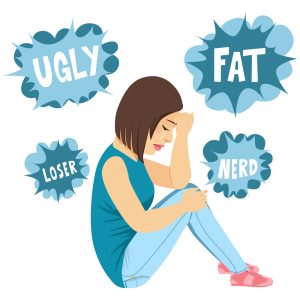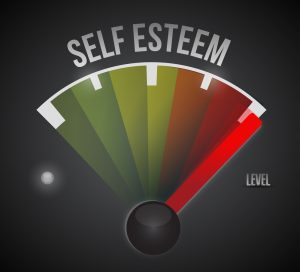Self esteem is critical to an emotional, mental and healthy life. A good self image helps one to live with confidence, approach goals, complete tasks, and find value in oneself. It is essential to find value in oneself and to find oneself worthy of love. Hence cultivating a healthy self esteem is important to a personal, academic, professional and social life.

Self esteem issues can go in two different directions. An inflated self esteem can lead one down an egotistical and narcissistic road with various anti social disorders. It can lead to delusions and foolish endeavors. In essence, it is not in balance with reality. Self esteem can also take an opposite dark road in which one finds no value in oneself and this can lead to depression, loss opportunities, poor health and possible suicide. This article will investigate the later and in particular how one can deal with self esteem and depression.
The article, “How to Manage Low Self-Esteem” by Corey Whelan looks in detail how low self esteem can derail a life, its sources and how to overcome it. She states,
“Everyone has moments of doubt about who they are and what they’ve achieved. You may do or say something that makes you temporarily ashamed of or annoyed with yourself. Those temporary or periodic feelings are not the same as low self-esteem. Low self-esteem refers to long-term negativity about who you are and how you show up in the world. These negative feelings can be persistent and hard to challenge. For example, if someone compliments you, you may not believe them. If you achieve a goal, you may not allow yourself to take credit for it.”
“How to Manage Low Self-Esteem”. Whelan, C. (2022). Healthline.
To review the article, please access here
Low Self Esteem
Causes of low self esteem range from various issues suffered at a younger age. Hyper critical parents or family can damage a child’s development. When a child is unable to meet certain psycho social goals within his/her age the child can be prevented from forming independence and the ability to do things. When a child is shamed for pushing forward, the impulse to be something greater can also be hampered. Hence due to criticism or inability to progress to new stages of development that highlight independence and creativity can greatly affect a child’s self esteem and provide future issues in advancement in life. Other forms of criticism include body shaming and bullying. These type of parental and as well peer abuse can cause severe self image issues within the person.
In addition, many children are unable to form healthy and supportive bonds due to attachment issues with parents. When children are not given security and love, then they become insecure and anxious. They begin to question themselves and find themselves not worthy of love or capable of being loved. These haunting memories of unloved childhood also cause great damage to self esteem.
Trauma and abuse also play a key role in lowering self esteem. Children of abuse, especially sexual abuse, feel dirty and unclean. They feel unable to be loved or love and consider themselves broken. This is often the case because the abuser not only physically assaults the child, but to protect himself/herself creates a illusion within the child’s mind that it is the child’s fault. The child then is haunted and unable to report the abuse and continues to feel broken and dirty.
Untrue Thoughts
Many with low self esteem have a inaccurate self image of self. Either through body shaming or verbal and mental abuse, the person feels they are worthless and amount to nothing. Many feel ugly, or dumb, or unlovable. They hence attach to any form of connection, even if unhealthy. A person with low self esteem is unable to see the value in oneself and is unable to move forward with confidence, accept compliments, boast of achievements, or recognize individual talent within oneself. A person with low self esteem has a difficult time accepting challenges, or attempting harder feats and will surrender before one even tries to do something. A person with low self esteem will feel unworthy, untalented and incapable of great things. Hence, a person will self esteem is unable to take criticism well and will amplify normal comments and make these comments more than what they truly are.

A person with low self esteem also has difficulty trusting one’s own instincts. Low self esteems restricts creativity and trust of self to do something. One needs constant coaching or discussion with others to engage in something. Also, low self esteem prevents boundaries. A person with low self esteem has a difficulty saying no to others and will find oneself doing things one does not really want to do. Hence low self esteem turns an individual into a people pleaser instead of looking out for oneself.
Dangerous Road
Those with low self esteem suffer physically, emotionally and mentally. Physically, they tend to take less care of themselves. They feel ugly and feel little need to care for oneself via grooming and exercise. This can lead to un-healthy life styles. Emotionally and mentally, one may punish oneself for false perceptions of being a failure. This can lead to self mutilation, self harm, risky behavior, drug addiction and drinking, depression, suicidal ideation and possible suicide attempts. In addition, it can prevent someone from achieving positive and happy experiences due to fear or rejection. Hence less chance for friendship, love and academic and professional success.
Overcoming Low Self Esteem
It is difficult for someone to overcome self esteem because one is blinded by a false perception. The person lives in a mirage of falsehood. Only till one is opened to reality can one start to escape the dark veil of low self esteem. This takes time, counseling and reframing of self. One can begin to rehabilitate self image through small goals and achievements. Whether it is a hobby, gym work, or academic and professional goals, one can begin to objectively calculate success and find to one’s amazement that these objective successful achievements coincide with not someone else but oneself. Hygiene, personal pride and goal setting can all play key roles in awakening someone to one’s best potential. Counselors can also help those with self esteem with positive affirmations, journaling and finding ways to surround oneself with positive people and energy instead of negative ones.
Overcoming low self esteem when dealing with depression can be an even more difficult feat. Depression already prevents one from finding joy in life. If one already is suffering from low self esteem, one will quickly travel down a darker road. Depression is usually correlated with lower self esteem and can become a result of constant gloomy outlooks on life. Those suffering from low self esteem and depression should constantly look to post positive affirmations about self and try to brag about life. They should write down positive things and journal. They should set realistic goals and avoid comparisons. They should also and most importantly be kind to oneself. Those with low self esteem and depression are their own worst critics. Self love is critical in these cases.
Conclusion
Self image needs to be balanced. It cannot become narcissistic but it cannot become deflated. It needs to find a happy balance with reality that is optimistic and able to help a person reach one’s fullest potential. Unfortunately, many suffer childhood bullying, criticisms and abuse which greatly affects their development and hence self esteem. This can lead to bad physical, emotional and mental health which can develop into possible depression or even suicide. It is important to identify low self esteem find help and incorporate strategies to improve self image. If dealing with depression or other trauma, a licensed counselor can help one find better self image.

AIHCP also offers a certification in Grief Counseling for qualified professionals in the healthcare and mental healthcare fields. The program is online and independent study and open to qualified professionals seeking a four year certification as a certified Grief Counselor.
Additional Resources
“9 Tips for Strengthening Self-Esteem When You Have Depression”. Coelho, S. (2022). PyschCentral. Access here
“11 Signs of Low Self-Esteem”. Cherry, K. (2023). VeryWellMind. Access here
“Self-esteem: Take steps to feel better about yourself”. Mayo Clinic Staff. (2022). Mayo Clinic. Access here
“Signs of Low Self-Esteem”. WebMed Editorial Contributers. (2022). WedMed. Access here




